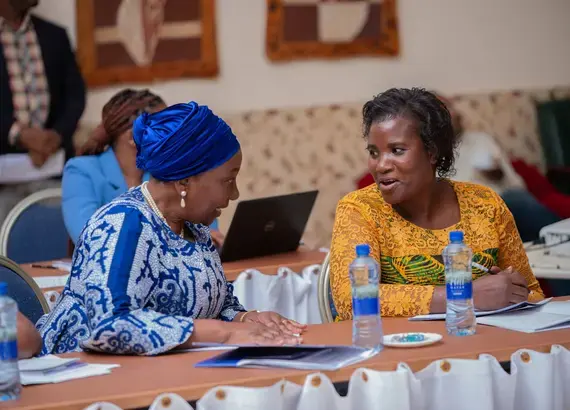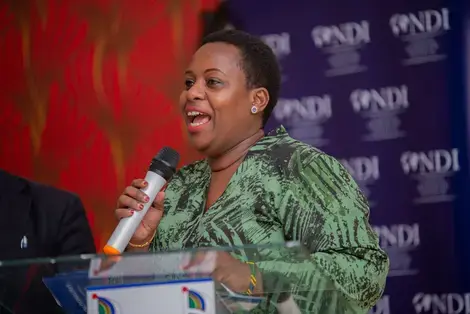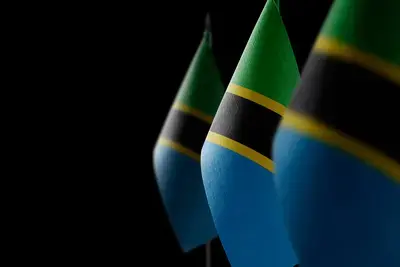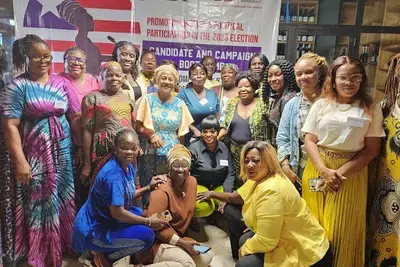
Success Story
Members of Parliament in Tanzania Advocate for Ground-Breaking Reforms
As Tanzania prepares for local elections in 2024 and the general election in 2025, there are hopes for democratic gains with political and electoral reforms that strengthen multiparty democracy. These hopes are based on the ascension of Tanzania’s first female president in 2021, who promised political reconciliation and governance reforms for the country's development. For five years, the USAID-funded Tushiriki Pamoja program has been working to address the under-representation of marginalized groups and supporting civil society organizations in the Ushiriki Tanzania (UT) coalition to advocate for the inclusion of women, youth and persons with disabilities (PWDs) in political and electoral processes. The relationships and trust NDI has cultivated over those five years with various government offices and opening windows of opportunity under the Hassan administration have been instrumental in creating space for women's political participation.
The Political Parties Act stipulates the values of gender equality, but there are no concrete measures stated to ensure that women are actually represented in political party affairs at all the different levels of government. This is an opportune time to bring forth this issue; we have a female president who also values this agenda. Therefore efforts such as these fellow MPs will help build momentum towards empowering other women in politics.
In response to citizens’ demands, NDI, the Friedrich Ebert Stiftung Foundation and UT collaborated with the Women in Politics Champions Parliamentary group and the Standing Parliamentary Committee on Governance, Constitution and Legal Affairs, voluntary advocacy groups including parliamentarians from different parties, to generate consensus on reforms needed to boost women’s political participation during a two-day workshop from June 17 to 18. This workshop provided a unique opportunity for members of parliament (MPs) to come together and advocate for reforms to core areas of the Political Parties Act and the National Electoral Act to better advance the inclusion of women in politics. The key resolutions focused on three major issues: incorporating a new quota system for party leadership and party candidate lists, recognizing violence against women in politics (VAW-P), and providing party subsidies for women candidates and women in political parties.
MPs agreed that even though there was a higher representation of women in elections and political offices than in previous elections, more needs to be done to strengthen internal party democracy through a gender quota system. A quota system would increase women's electability by setting a minimum percentage of women candidates in both local government and national elections. Furthermore, the MPs agreed that presidential candidates and their running mates must be of different genders.
Regarding VAW-P, MPs agreed they must develop policies and a new culture in political parties and take action against perpetrators of gender-based violence to encourage women to partake in elections and political activities. Esther Matiku (Special Seats, MP for CHADEMA) stated, “Senior leadership is male-dominated; therefore, the needs of women are not likely to be addressed adequately; therefore, there is an important need to address women's representation within leadership of political parties.”
Lastly, concerning subsidies, a constituency fund should be considered for special seats for women MPs to enable them to competitively vie for leadership positions both at the local government and national levels.
There was consensus among the MPs echoed by Hon. Florent Kyombo (MP), vice chair of the Parliamentary Committee on Governance, Constitutional, and Legal Affairs, who said:
“All Members of the Standing Parliamentary Committee have joined the Women in Politics Champions Parliamentary Group. We commit to striking the right balance in the Political Parties Act and National Elections Act that will pave the way to have more Women in Politics at Local Government and National Level.”
At the conclusion, key resolutions were read, and the MPs agreed to submit them to the Minister of Constitutional and Legal Affairs and the Office of the Registrar of Political Parties for inclusion in legislation. The resolutions will guide the champions to continue their advocacy with other members of parliament and in their respective political parties. They include the following:

Photo: Honorable Neema Lugangira, a member of parliament and inclusion champion.
The laws should clearly mandate that presidential candidates and their running mates must be of the opposite gender;
Political parties should adhere to quotas to ensure a minimum of 20 percent of women candidates in all elections, including party, local government and general elections;
Political parties should establish gender policies and establish gender offices to address VAW-P within their ranks;
Online abuse of women in politics before, during, and after elections should be legally recognized as a form of VAW-P, leading to disqualification and removal of the candidate from the candidacy list. Specific guidelines are necessary for clarity; and
Special consideration should be given to subsidies, constituency funds for special seats, or the creation of seats for female MPs.
This two-day parliamentary workshop provided a platform for parliamentarians to share perspectives, agree on reform areas and coordinate efforts to move reform forward. By convening this workshop, the inclusion champions, a multiparty group that advocates for inclusion reforms, have ensured buy-in from the Standing Parliamentary Committee and that the MPs are ready to review these reform issues when the cabinet submits amendments, which is expected later this year. The workshop also served as a networking event wherein the MPs were able to collaborate with inclusion champions, and 14 members from the Standing Parliamentary Committee on Governance, Constitution and Legal Affairs committed to becoming champions. In the coming months, the champions will work closely with parliamentary group leadership to continue consensus-building with fellow MPs, bolster reforms by engaging government agencies including the Office of the Registrar of Political Parties, the Ministry of Constitutional and Legal Affairs and the Ministry of Community Development, Gender, Women and Special Groups as well as obtain citizen input on the reforms to the Political Parties Act.


